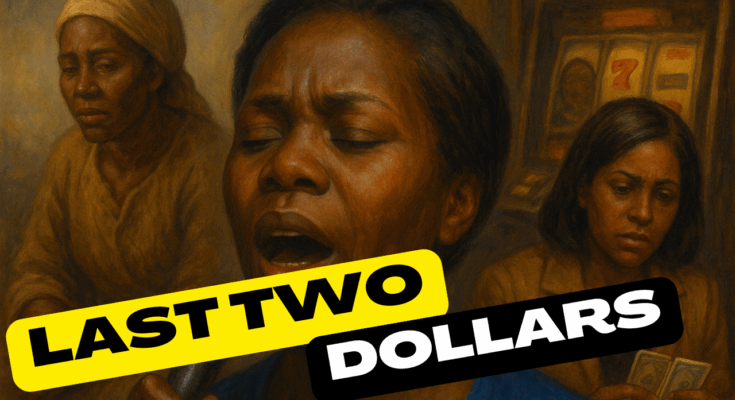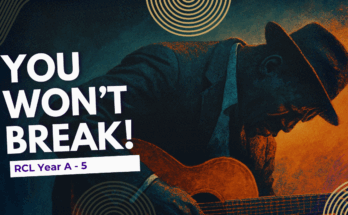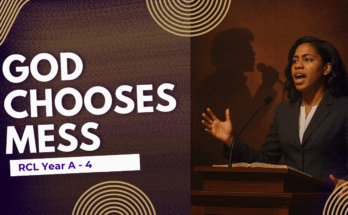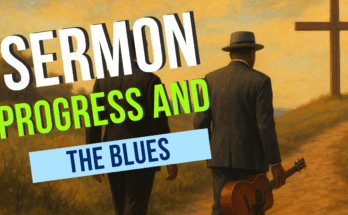As an Amazon Associate I earn from qualifying purchases.
Johnnie Taylor told a story in Last Two Dollars that sits right next to the story of Elijah and the widow at Zarephath. Both are women at the bottom. Both are holding almost nothing. But their posture is different — and that’s where the theology lives.
The Blues Woman
Picture it. A woman in a casino, chasing a no-good man who hasn’t treated her right. She went there searching for him, maybe hoping for reconciliation, maybe trying to prove a point. But instead of finding love, she found herself broke. The machines ate her money, the noise drowned out her dignity, and she was left with nothing but her truth.
But listen closely: she doesn’t collapse in shame. She doesn’t beg strangers for pity. She doesn’t cry out, “This is the end of me.” No — she squares her shoulders, looks straight ahead, and says—
“Just loan me two dollars till the next time I see you.
One for the jukebox, one for the bus fare.”
That is pure blues theology. One coin to lament, one coin to keep going. One coin for the sorrow that must be sung, one coin for the survival that must be lived. She knows she’ll be back. She knows the night won’t kill her. She’ll sing her pain, ride her bus, and rise tomorrow with breath still in her lungs.
In that one request is a whole gospel: survival is enough. Dignity is preserved. She may not have the man, the money, or the win, but she still has her song and her way home. And that’s enough to live another day.
The Widow at Zarephath
Now turn to Scripture — 1 Kings 17. Elijah, God’s prophet, shows up in Zarephath during a drought. The ground is cracked. The sky has been closed. Food is scarce. People are weak. He meets a widow gathering sticks. She is a mother. A survivor. And she gives Elijah her testimony in one trembling sentence:
“I have only a handful of flour in a jar and a little oil in a jug. I’m going to prepare it for me and my son, that we may eat it — and die.”
This is the sound of despair. Hear the difference? The blues woman says, “I’ll make it through tonight.” But the widow says, “This is my last night.” One woman is preparing to keep going. The other is preparing to die.
But God’s word interrupts despair. Through Elijah comes the promise:
“The jar of flour will not be used up and the jug of oil will not run dry until the Lord sends rain on the land.”
And it happened. Not in barns overflowing. Not in silos filled to the brim. But in daily, quiet survival. The jar never went empty. The jug never went dry. Every single day she thought she had reached the end — and every single day God gave her just enough to keep going.
The Contrast
Put them side by side and you see the difference:
- Blues woman: “I’ll make it through the night. Give me a song and a ride home.”
- Zarephath widow: “This is my last meal. I’m preparing to die.”
The blues woman already believes in survival. The widow believes in death. But then the Word of God changes her story. The widow learns what the blues woman already knows — your survival is your miracle.
In other words: your last two dollars will last longer than you think.
Theology of Survival
We live in a world where pulpits often promise prosperity. Barns filled to bursting. Cups running over. Overflow in every direction. But both women remind us: sometimes the miracle is not in overflow but in endurance.
Israel wandered in the wilderness for forty years. They didn’t have grocery stores. They didn’t have stockpiles. They had manna — daily bread, just enough for each day. Paul prayed three times for his thorn to be removed, but God answered with sufficiency, not abundance: “My grace is sufficient for you.” Jesus taught us to pray, “Give us this day our daily bread.” Not bread for the next decade. Not bread for retirement accounts. Just bread for today.
That is the blues gospel in a sentence: Your survival is your miracle.
Lament, Then Survive
The woman in Last Two Dollars faced the truth: she wasn’t going to win that night. She wasn’t going to walk out with a jackpot. She wasn’t going to catch her man. But she refused to let despair write her ending. Instead, she practiced a liturgy of dignity: lament, then survive.
- One for the jukebox: Sing the sorrow until it leaves your chest.
- One for the bus fare: Get back home, wake up, and live one more day.
That’s exactly what the widow learned at Zarephath. Every day, she thought her jar was empty. Every day, God proved it still had something left. She thought it was over; God showed her it was survival. Not abundance — survival. And survival was enough.
Survival Songs
This is why the church has always been a singing people. Survival demands a soundtrack. That’s why our ancestors sang in the fields, in the brush arbors, in the churches with wooden floors. They sang survival into existence. They sang because they had to.
That’s why we still sing:
“I don’t feel no ways tired, I’ve come too far from where I started from.”
That’s not the voice of prosperity. That’s the voice of survival. That’s a declaration: I’m still here.
“Hold on just a little while longer, everything will be all right.”
That’s not denial. That’s faith. That’s the same spirit as the jukebox coin and the widow’s jar — a testimony that survival is enough.
Don’t Miss the Miracle
And here’s the warning: don’t miss your miracle just because it looks small. Don’t overlook it because it isn’t flashy. Don’t despise it because it isn’t overflow. If you’re still breathing, you’re living in miracle territory.
If you made it through the night, you’ve already touched God’s grace. If you woke up this morning with a jar that still had something in it, you’ve witnessed a miracle. If you still have a song left in your throat and a way home to go to — you’re standing in the middle of grace.
The Flurry
So when you’re down to your last two dollars — don’t despise it.
When you’re scraping the bottom of the jar — don’t curse it.
When you think it’s over — don’t bury yourself too soon.
Your last two dollars will last longer than you think.
The jar won’t run out.
The jug won’t run dry.
Your survival is your miracle.
So testify with the blues woman: “Loan me two dollars till the next time I see you.”
Testify with the widow: “The jar didn’t run out; the jug didn’t go dry.”
Testify with the ancestors: “I don’t feel no ways tired… hold on just a little while longer.”
Child of God, you’ve been through the night but you’re still standing. You’ve been knocked down but you’re still breathing. You’ve been empty but you’re still alive.
That’s the miracle — you survived, and you will again.
Amazon and the Amazon logo are trademarks of Amazon.com, Inc, or its affiliates.







